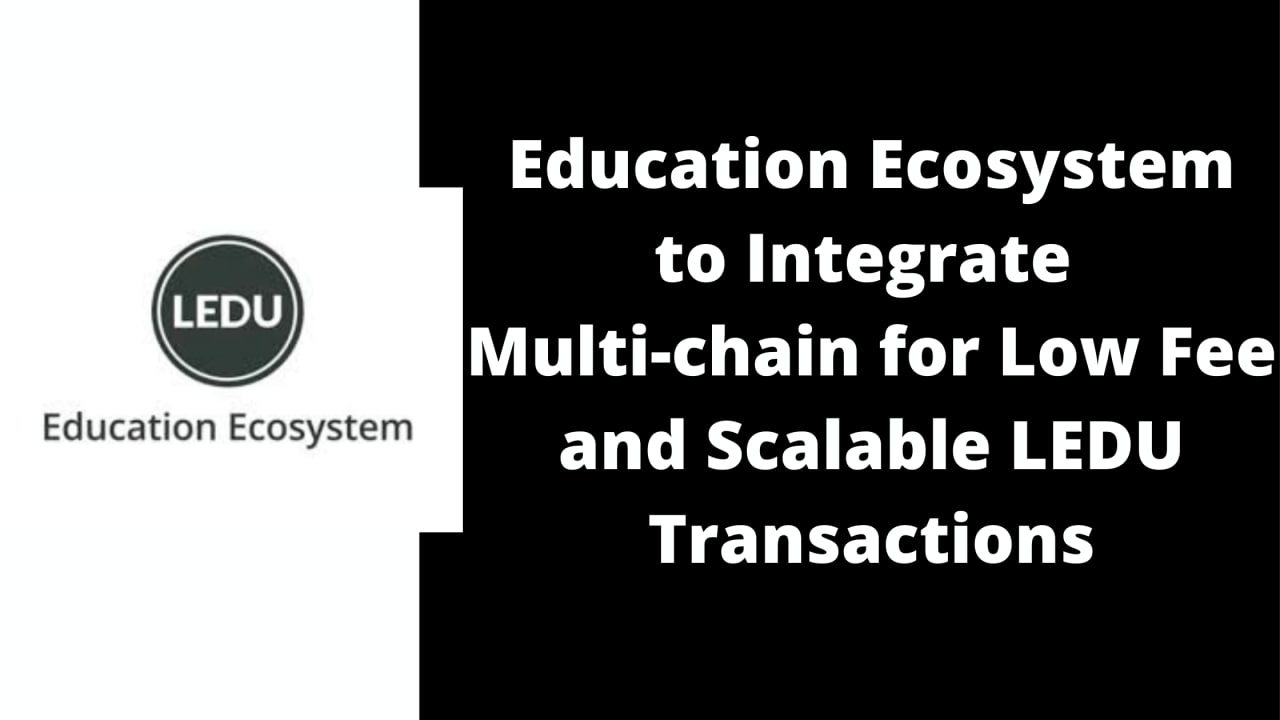Education Ecosystem to Integrate Multi-chain for Low Fee and Scalable LEDU Transactions
Disclaimer: The text below is a press release that was not written by Cryptonews.com.

Education Ecosystem is announcing it will be integrating more chains to its Ethereum chain peer-to-peer online learning platform. The peer-to-peer project-based learning platform will be integrating the Binance chain and Polygon to mitigate the limitations of ERC20 standard tokens, increase LEDU transaction speed, and offer lower gas transactions for LEDU holders and participants.
From single chain to multi-chain
Education ecosystem has performed millions of transactions and hosted over 20 million viewers in its Ethereum based online learning projects. However, it is announcing integrating more chains to accomplish its scalable, low fee, and multi-chain peer-to-peer vision for LEDU transactions.
Integrating more chains to the current Ethereum built education ecosystem chain will mean fewer fees and more robust interoperable developments and other features associated with multi-chain transactions. After reviewing the top cost-efficient ERC20 compatible side chain, the project will leverage the features and functionalities of the Binance smart chain and Polygon chains. Upon integration, Education Ecosystem will move from a single chain to a multi-chain platform, improving user experience, scalable transactions while introducing low-fee LEDU transactions for various LEDU use cases.
Binance smart chain
Binance smart chain is an ultra-fast and low fee dual chain architecture side chain that allows programming freedom. It is built from the ground up with GO, Java, Javascript, C++, C#, Python, and Swift to empower users to deploy interoperable network API and project-based solutions from one blockchain to Binance chain. Binance smart chain is compatible with the Ethereum Virtual Machine, EVN, and will allow users to switch between Ethereum and Binance chain using the Binance smart chain bridge. In the same way, LEDU holders can perform transactions with either blockchain, depending on preference.
Polygon
Polygon is popularly called “Ethereum’s internet of blockchains” for allowing interoperability between networks to help solve Ethereum’s scaling problems. Polygon combines Ethereum’s compatible proof of stake chain and Plasma Chain, which will enable LEDU holders, developers, and businesses to perform seamless transactions. The aim is to allow limitless payment for building interoperable, ultra-fast Cybersecurity, programing, data science, artificial intelligence-related project-based DApps, respectively.
What multi-chain mean for the LEDU community
Education Ecosystem integrating multi-chain on its parent Ethereum chain is synonymous with building on giants’ shoulders to achieve incredible feats. It will allow LEDU holders, developers, mentors, and other Education ecosystem participants to perform low fee transactions, multi-standard development, more use cases such as NFT incorporation, and other benefits of the multi-chain. Combining or performing cross-chain transactions will improve LEDU payment speed, remove the Ethereum associated scalable problem, and encourage more participants to hold LEDU.
About Education Ecosystem
Education Ecosystem is a decentralized learning ecosystem that teaches professionals and college students how to build real products. We are building the world’s most significant learning ecosystem for future technology topics like artificial intelligence, Cybersecurity, game development, data science, cryptocurrencies, and programming.
The main participants in the ecosystem are project creators, viewers, moderators, API developers, and developer-focused companies. Project creators create educational projects and are paid monthly, lifelong royalty fees as viewers learn from their projects.
Disclaimer: The text above is an advertorial article that is not part of Cryptonews.com editorial content.


